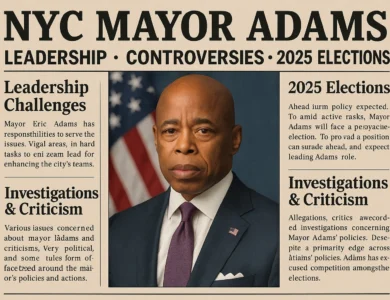
In the landscape of contemporary political journalism and intellectual discourse, few voices resonate as profoundly as Ezra Klein. As the founder of Vox, host of “The Ezra Klein Show” podcast, and a New York Times columnist, Klein has established himself as one of the most influential political commentators of our generation. His unique ability to dissect complex policy issues, analyze media ecosystems, and understand the psychological underpinnings of political behavior has made him essential reading for anyone seeking to understand our rapidly changing world.
What sets Ezra Klein’s work apart from conventional journalism is his commitment to intellectual honesty and his willingness to challenge his own assumptions. Rather than simply reporting on political events, Klein examines the systems and structures that shape our collective thinking. His insights draw from diverse fields including psychology, economics, political science, and philosophy, creating a multidimensional understanding of contemporary issues.
This article explores five transformative Ezra Klein insights that have the power to fundamentally change how you think about politics, media, communication, and society. Whether you’re a political enthusiast, a student of journalism, or simply someone seeking to better understand the world around you, these perspectives offer valuable frameworks for navigating our complex modern landscape. Each insight represents years of careful observation, rigorous research, and thoughtful analysis that Klein has shared through his various platforms.
1. The Power of Identity Over Ideology in Political Behavior
Why Our Tribal Instincts Trump Rational Policy Preferences
One of the most significant Ezra Klein insights centers on the role of identity in shaping political behavior. In his book “Why We’re Polarized,” Klein presents compelling evidence that our political choices are driven less by careful policy analysis and more by group identity and tribal affiliations. This political insight challenges the traditional view that voters are primarily rational actors who evaluate candidates based on policy positions.
Klein’s research reveals that political polarization has intensified because politics has become increasingly aligned with other aspects of our identity—race, religion, geography, and cultural values. When these identities stack on top of each other, they create what social scientists call “mega-identities” that make political disagreement feel like personal attacks. This phenomenon explains why political discussions often feel so emotionally charged and why changing someone’s mind through factual arguments proves so difficult.
Practical Applications for Better Political Understanding
Understanding this insight has profound implications for how we engage in political discourse. Rather than assuming that presenting better facts or superior arguments will convince others, Klein suggests we need to recognize the identity-driven nature of political beliefs. This doesn’t mean abandoning truth or accuracy, but rather approaching disagreements with greater empathy and recognition of the psychological forces at play.
For media consumers and political communicators, this Ezra Klein perspective suggests that effective persuasion requires addressing identity concerns rather than simply presenting policy details. It also helps explain why some policy positions that seem obviously beneficial fail to gain traction—they may threaten people’s sense of group belonging or status.
2. The Media’s Role in Amplifying Outrage and Polarization
How Attention Economics Shape Our Information Diet
Another crucial Ezra Klein insight examines how modern media ecosystems, particularly social media platforms, systematically amplify extreme voices and controversial content. Klein argues that the attention economy inherent in digital media creates perverse incentives that reward outrage, conflict, and polarization over nuance, complexity, and compromise.
Through his work at Vox and his podcast, Klein has consistently highlighted how algorithmic curation and engagement metrics privilege content that triggers strong emotional responses. This means that the most extreme voices—those who express the most outrage or make the most provocative claims—receive disproportionate amplification. The result is a distorted public discourse where moderate voices struggle to be heard and the appearance of extreme polarization may exceed the actual polarization in society.
Navigating the Information Landscape More Thoughtfully
This political commentary from Klein offers important guidance for media consumers. He suggests developing what he calls “information hygiene”—being intentional about our media consumption and recognizing when we’re being manipulated by attention-seeking content. Understanding that social media platforms are designed to maximize engagement rather than inform or educate helps us approach online content with appropriate skepticism.
For journalists and content creators, this insight emphasizes the responsibility to resist the temptation of outrage-driven content. Klein’s own work at Vox attempted to model a different approach—”explanatory journalism” that prioritizes understanding over provocation, context over controversy.
3. The Importance of Conversational Listening in Understanding Complexity
How Deep Listening Reveals Hidden Assumptions
Perhaps the most distinctive aspect of Ezra Klein’s work is his approach to interviewing on “The Ezra Klein Show” podcast. His insight here is that truly understanding complex ideas requires a specific kind of deep, patient listening that is increasingly rare in modern media. Klein doesn’t approach interviews as opportunities to challenge or debate guests, but rather as chances to genuinely understand their worldview from the inside.
This interviewing philosophy reflects Klein’s belief that most interesting thinkers have valuable insights even when we disagree with their conclusions. By creating space for nuanced exploration of ideas, Klein demonstrates that complexity and contradiction are features, not bugs, of intellectual life. His conversations often run 90 minutes or longer, allowing time to move past talking points into more substantive territory.
Transforming How We Engage with Different Perspectives
The practical application of this Ezra Klein insight extends far beyond professional journalism. In our personal and professional lives, adopting this approach to conversation can dramatically improve our understanding of others and strengthen our own thinking. Rather than listening to respond or to identify flaws in others’ arguments, Klein models listening to understand—genuinely trying to see the world through another person’s framework.
This style of intellectual discourse is particularly valuable in our polarized era. It doesn’t require abandoning our own convictions, but it does require recognizing that even people with fundamentally different views often have coherent internal logic that deserves exploration. This insight has helped Klein build bridges across ideological divides and surface surprising areas of agreement.
4. The Overlooked Impact of Institutional Design on Outcomes
Why Systems Matter More Than Individual Actors
A recurring theme in Ezra Klein’s analysis is the crucial importance of institutional design and systems thinking. Klein consistently argues that we overestimate the impact of individual political actors and underestimate how institutional structures shape outcomes. This political insight redirects attention from personality-driven coverage to the less sexy but more consequential realm of procedural rules, incentive structures, and system design.
In his coverage of healthcare, climate policy, and political reform, Klein demonstrates how institutional arrangements—legislative procedures, electoral systems, regulatory frameworks—create the boundaries within which individual actors operate. For example, he’s extensively covered how the structure of the Senate, with equal representation for all states regardless of population, creates systematic biases in American democracy that no amount of individual effort can overcome.
Rethinking Solutions to Societal Challenges
This Ezra Klein perspective has important implications for how we approach social problems. Rather than focusing exclusively on electing the “right” people or hoping for inspired leadership, Klein suggests we need to focus more attention on reforming the systems and institutions themselves. This might mean electoral reform, changes to legislative procedures, or restructuring incentives within various sectors.
For anyone working in policy analysis or organizational management, this insight offers a valuable framework. It suggests that sustainable change requires attention to structural factors—how are decisions made, what incentives do people face, what constraints shape behavior? Individual heroes or villains matter less than we typically assume.
5. The Necessity of Intellectual Humility in a Complex World
Embracing Uncertainty as a Feature of Honest Thinking
Perhaps the most philosophically profound Ezra Klein insight is his emphasis on intellectual humility—the recognition that our understanding is always partial, our predictions frequently wrong, and our confidence often misplaced. Throughout his work, Klein regularly acknowledges the limitations of his own knowledge and the genuine difficulty of forming accurate views on complex subjects.
This stance might seem like a weakness in a media environment that rewards confident proclamations and definitive takes. However, Klein argues that intellectual humility is actually a strength—it opens us to new evidence, makes us more persuasive to skeptical audiences, and produces more accurate understanding over time. His willingness to publicly change his mind or acknowledge mistakes models a healthier relationship with ideas.
Building a More Honest Intellectual Practice
Incorporating this insight into our own thinking means actively cultivating comfort with uncertainty and ambiguity. Klein suggests we should hold our views with appropriate tentativeness, proportional to the actual strength of available evidence. This doesn’t mean abandoning all convictions, but rather distinguishing between things we’re genuinely confident about and things where reasonable people can disagree.
For professionals in journalism, academia, or any field requiring public intellectual work, this Ezra Klein philosophy offers liberation from the pressure to have an immediate, confident opinion on everything. It suggests that saying “I don’t know” or “this is complicated” can be more valuable than offering premature certainty. This approach to intellectual discourse elevates the overall quality of public conversation.
Conclusion
The five Ezra Klein insights explored in this article offer powerful frameworks for understanding our contemporary world. From recognizing the primacy of identity over ideology in political behavior, to understanding how media systems amplify outrage, to practicing deep listening, emphasizing institutional design, and embracing intellectual humility—these perspectives can fundamentally transform how you engage with politics, media, and complex social issues.
What makes Ezra Klein’s work particularly valuable is his synthesis of insights from diverse fields into coherent, actionable understanding. His political commentary doesn’t fit neatly into conventional ideological categories precisely because he’s willing to follow evidence and logic wherever they lead, rather than adhering to predetermined positions.
Applying these insights requires practice and intention. Start by noticing your own identity-driven reactions to political information. Examine your media consumption habits and consider whether they’re serving your genuine interest in understanding or simply feeding outrage. Practice deeper listening in conversations. Think systematically about institutional structures rather than focusing solely on individuals. And cultivate comfort with uncertainty and complexity.
The world that Ezra Klein helps us understand is messier and more complicated than simple narratives suggest—but also more interesting and ultimately more navigable when approached with the right conceptual tools. These five transformative insights provide those tools for anyone committed to clearer thinking in our complex modern landscape.
Read More: Zohran Mamdani 5 Powerful Wins That Prove He’s Unstoppable






